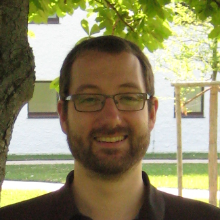Mr. Alkämper, why mathematics? Or: Why mathematics for you?
I think that's because I've always had quite a relativ talent for mathematics. I also took part in several mathematics competitions at school, which were quite successful. Then, of course, that somehow came about. Besides, the big advantage when I started studying in Duisburg was that mathematics was free and I could even enrol 10 days after the beginning of the semester. That was very practical.
Just like me. This means that the choice of studies and the doctoral subject was only out of pure interest and not because of ambitions regarding profession or something similar?
Partly. I would say that a large part was certainly the interest in continuing mathematics in some way. But another big part was simply that my supervisor, Mr. Siebert, offered me a doctoral position. I didn't have to consider what else to do. So to a certain extent, I would say, it is also pragmatism.
Interesting, so that you can slip into a PhD position through pragmatism. While doing your doctorate, did you ever think that it would be too difficult? Or that you might want to quit?
No, I don't think so. I always had such short-term goals or exciting problems that I thought I could make progress here. In the first half of my doctorate, I was almost only concerned with the implementation of a grid manager. It was foreseeable that this would eventually end in a finished project. It was very practical to have this intermediate step, this intermediate goal.
So you would consider milestones important?
Yes, I think milestones are important. However, one should set realistic milestones, foreseeable milestones and not foreseeable for the supervisor, but foreseeable for the doctoral student.
What will the future bring? Why not pursue a career as a post-doc or even a junior professor?
In the current scientific world, I think that the time or the effort one has to put into actually becoming or habilitating a junior professor is not or not well compatible with family/family formation. Since I already have a child and would like to spent time with, I am planning a different career. For example, in research and development at well-known companies here in the area, where one actually have a fixed 35-hour week.
However, I can also imagine very well to become a house husband - full-time - and let my wife bring in the money.
And as a sideline?
Maybe I would work on software projects as a sideline.
I could also imagine this: doing software projects in my spare time and otherwise a regular
income.
Then I wish you all the best for the future and that mathematics can and will continue to
accompany you.
Yes, thanks. And thank you very much for the nice talk.
The interview was conducted by Stephan Hilb.
Institute of Applied Analysis and Numerical Simulation
Numerical Mathematics for High Performance Computing


